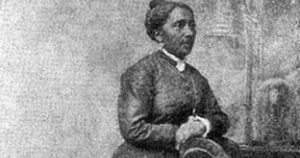
Elizabeth Jennings Graham
*This date in 1827 is celebrated as the birth date of Elizabeth Jennings Graham. She was a Black teacher, church organist, and civil rights figure.
Elizabeth Jennings was born free in New York City. Her parents, Thomas L. Jennings and his wife, born Elizabeth Cartwright, had three children. Their names were Matilda Jennings Thompson, Elizabeth Jennings Graham, and James E. Jennings. Her father was a Freeman, and her mother was born enslaved. He became a successful tailor and an influential New York Black community member. Her mother, Elizabeth Cartwright Jennings, was a prominent woman in the community. She is known for penning the speech 10-year-old Elizabeth Jennings delivered, "On the Improvement of the Mind," at a meeting of the Ladies Literary Society of New York (founded 1834). Produced and given in 1837, the speech discusses how the neglect of cultivating the mind would keep blacks inferior to whites and make whites and enemies believe that blacks do not have any minds.
By 1854, young Jennings had become a schoolteacher and church organist. She taught at the city's private African Free School, which had several locations by then, and later in the public schools. On Sunday, July 16, 1854, Jennings went to the First Colored Congregational Church as an organist. She was running late and boarded a Third Avenue Railroad Company streetcar at the corner of Pearl Street and Chatham Street. The conductor ordered her to get off. When she refused, the conductor tried to remove her by force. Eventually, with the aid of a police officer, Jennings was ejected from the streetcar.
The incident sparked an organized movement among black New Yorkers to end racial discrimination on streetcars. Frederick Douglass publicized her story in his newspaper, and it received national attention. Jennings's father filed a lawsuit (on behalf of his daughter). Jennings v. Third Avenue Railroad was against the driver, the conductor, and the Third Avenue Railroad Company in Brooklyn, where the Third Avenue Company was headquartered. In 1855, the court ruled in her favor. In his charge to the jury, Brooklyn Circuit Court Judge William Rockwell declared: "Colored persons, if sober, well behaved and free from disease, had the same rights as others and could neither be excluded by any rules of the company nor by force or violence." The next day, the Third Avenue Railroad Company ordered its cars desegregated.
Jennings married Charles Graham of Long Branch, New Jersey, in Manhattan on June 18, 1860. They had a son, Thomas J. Graham. He was a sickly child who died of convulsions at the age of one during the New York Draft Riots. After the New York Draft Riots, there were numerous attacks against the Black community. The Grahams left Manhattan with her mother to live with her sister Matilda in Monmouth County, New Jersey, near Eaton. Charles died in 1867 while they were living in New Jersey. Jennings and her mother and sister moved back to New York City in the late 1860s or 1870.
She lived her later years at 247 West 41st Street. She founded and operated the city's first kindergarten for Black children in her home. According to her tombstone, she died on June 5, 1901, at 74, and was buried in Cypress Hills Cemetery with her son and husband. In 2007, New York City co-named a block of Park Row "Elizabeth Jennings Place" after a campaign by children from P. S. 361.
In 2018, the first biography of Elizabeth Jennings was published, written by Amy Hill Hearth and entitled Streetcar to Justice: How Elizabeth Jennings Won the Right to Ride in New York, intended for middle-grade to adult readers. Jerry Mikorenda authored America's First Freedom Rider: Elizabeth Jennings, Chester A. Arthur, and the Early Fight for Civil Rights, about the legal fight that arose from her forcible removal from the streetcar, published in December 2019. In 2019, New York City was announced to build a statue honoring Graham near Grand Central Terminal.